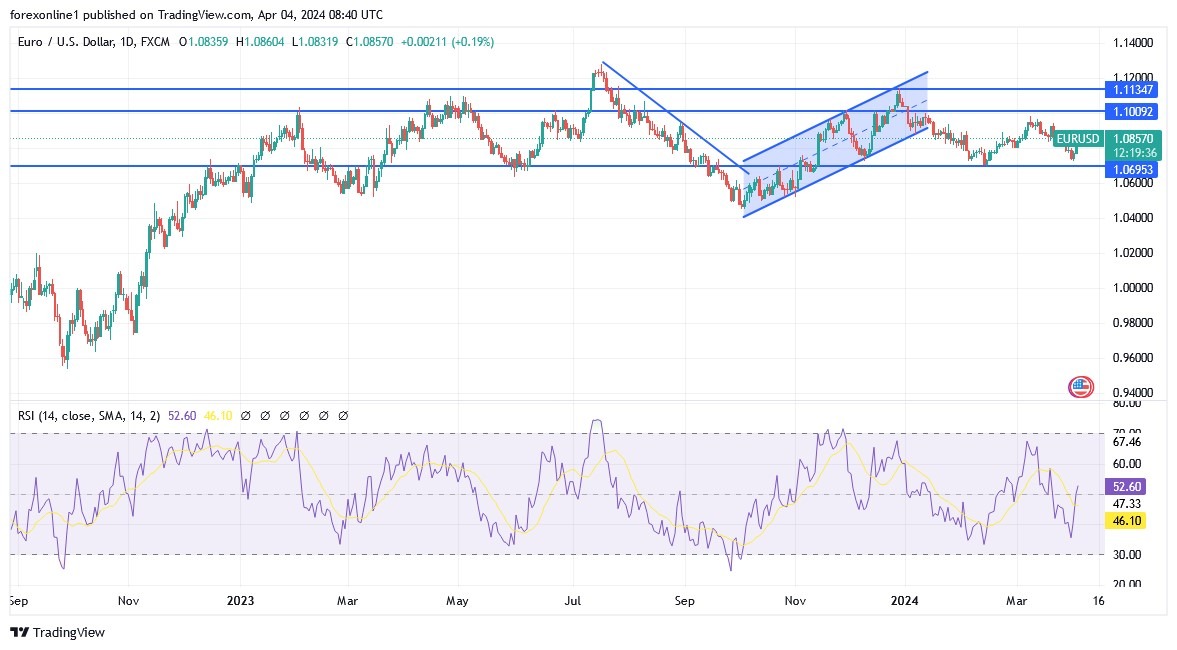EUR/USD Analysis: Rebound Gains Still Weak
The outlook for the pair is very bearish, with the next level to watch being at 1.0690, its Valentine's Day low.
- According to recent trading, the EUR/USD exchange rate was softer after inflation data for March declined, but it is important to keep in mind that there are inflationary trends that will limit any weakness.
- According to the results of the economic calendar data, inflation in the Eurozone's Consumer Price Index fell to 2.4% year-on-year in March from 2.6% in February, according to Eurostat, below expectations of 2.5%.
- Core inflation fell to 2.9% from 3.1%, below market expectations of 3.0%.
(Click on image to enlarge)
This decline explains the recent retracement in EUR/USD exchange rates, but there are details in the report that suggest any weakness related to inflation will be limited. Despite the announcement, there were opportunities for the EUR/USD to rebound higher. Gains are extending to the 1.0836 resistance level and extending in today's session, Thursday, to the 1.0860 resistance level, around which it is stabilizing at the time of writing the analysis.
Analysts at Commerzbank commented on inflation figures in the euro zone by saying: “Core inflation has risen sharply since the beginning of the year.” It indicates that the basic index rose by 0.3% on a monthly, seasonally adjusted basis. Therefore, the 5-month moving average continues its upward trend. Now that the dampening effect of energy prices on the core rate is beginning to fade, strong wage increases are helping the core index rise strongly again. According to European Central Bank estimates, collectively agreed wages are likely to rise by an average of 4.5% this year. Therefore, if this trend continues in the coming months, as we expect, core inflation will continue to decline slightly on an annual basis until mid-year.
Commerzbank estimates that inflation should remain in the long term at 3%, higher than the European Central Bank's target of 2%. Accordingly, the European Central Bank (ECB) is expected to cut interest rates in June, but inflation dynamics indicate the need to proceed slowly, limiting the downside of the EUR/USD.
Generally, services inflation in the euro area remained steady at 4.0% in March, so this stubbornness could severely limit the deflation process. According to analysts, service price inflation is expected to continue to rise due to continuing pressure on wages. For its part, the European Central Bank said that it will be very attentive to wage negotiations this spring and believes that high settlements will ensure services inflation remains high, ensuring the need to be vigilant about the future path of interest rates. Accordingly, Nordea Bank expects the European Central Bank to move only gradually when reducing interest rates, given the strong development in the labor market, which will keep service price inflation somewhat high.
Meanwhile, there are many indicators that the European Central Bank will make its first interest rate cut in June. According to our estimates, the ECB is also likely to reduce the deposit rate from the current 4.0% to 3.0% in a total of four steps by the first step. However, in light of the inflation rate, which has settled well above 2%, the central bank is likely to reconsider raising future interest rates next year.
All of this points to the euro's continued resilience, all other things being equal.
EUR/USD Technical Analysis and forecast:
EUR/USD reached a new monthly low of 1.0725 last week, as expected. However, the momentum appears to have stalled at the moment, as the US dollar is in the overbought zone on a daily basis, indicating a countermove. The next short-term price target is 1.0830, which is also the 50- and 200-day moving average. The EUR/USD pair has been in a strong downtrend over the past few weeks. This decline occurred after the pair peaked at 1.0978 in March. On the daily chart, the pair fell below the lower side of the pitchfork tool. Concurrently, the exchange rate fell below the 50-day and 25-day moving averages. The two averages formed a bearish crossover pattern. Also, the Klinger Index and the Money Flow Index (MFI) indicated a decline.
Therefore, the outlook for the pair is very bearish, with the next level to watch being at 1.0690, its Valentine's Day low. Clearly, a drop below this level will see the pair decline to the main support level at 1.0600. Ultimately, there will be no upward shift in the trend without moving towards the 1.1000 resistance.
More By This Author:
Gold Analysis: Breaks New Historical ResistanceGBP/USD Analysis: Bears In Control
Gold Analysis: Bullish Breakouts Continue
Disclosure: DailyForex will not be held liable for any loss or damage resulting from reliance on the information contained within this website including market news, analysis, trading signals ...
more



